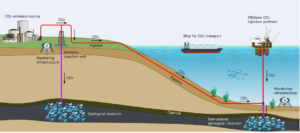Project Description:
With increasing of knowledge of the effect of CO2 on climate change, scientists and engineers are investigating mechanisms to decrease emissions of CO2 into the atmosphere.

One promising approach increasingly recognised is Carbon Capture and Storage (CCS). In CCS schemes, CO2 is captured from large scale industrial emitters and transported to either be used (e.g., algae cultivation) or stored permanently in geological sites where it is injected into a rock formation (e.g., geological formation under the North Sea). The wellbore around the storage site is under complex loading conditions and any changes could contribute to the failure or dysfunction of the wellbore. The aim of this project is to develop and experimentally validate a CO2 injection model which will take into account thermo-hydro-mechanical coupling effects on wellbore stability caused by intermittent injection of CO2 and the expansion of CO2 inside the wellbore.
| Project Details:
Duration: 2018 to 2022 Research Methods:
|
Project Investigators:
Funder: Engineering and Physical Sciences Research Council, UK |